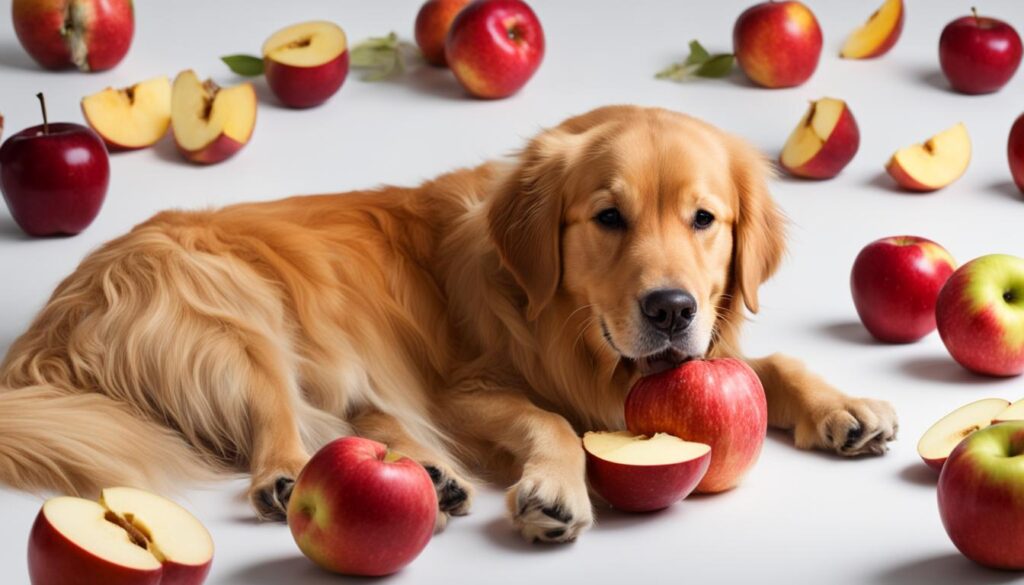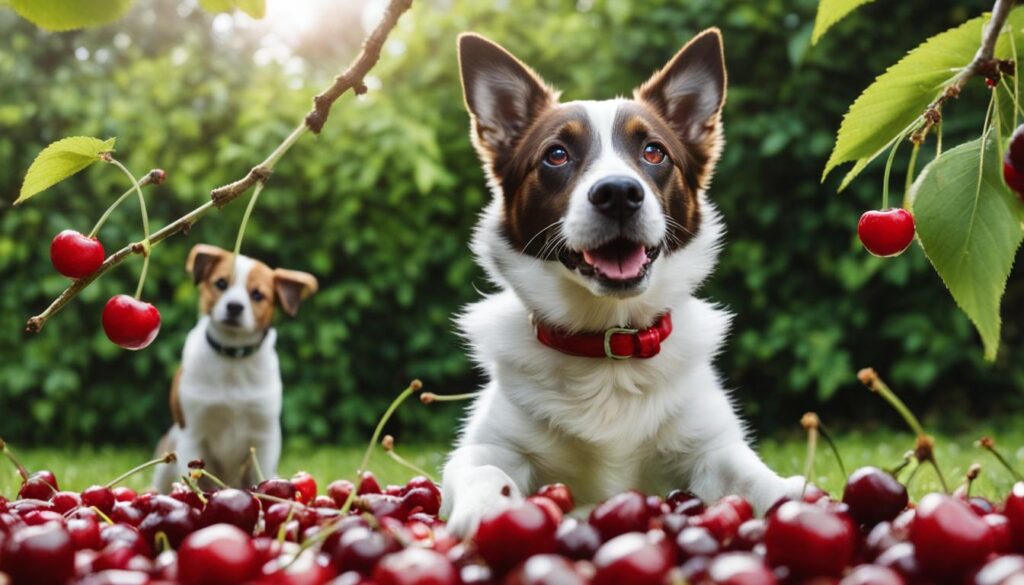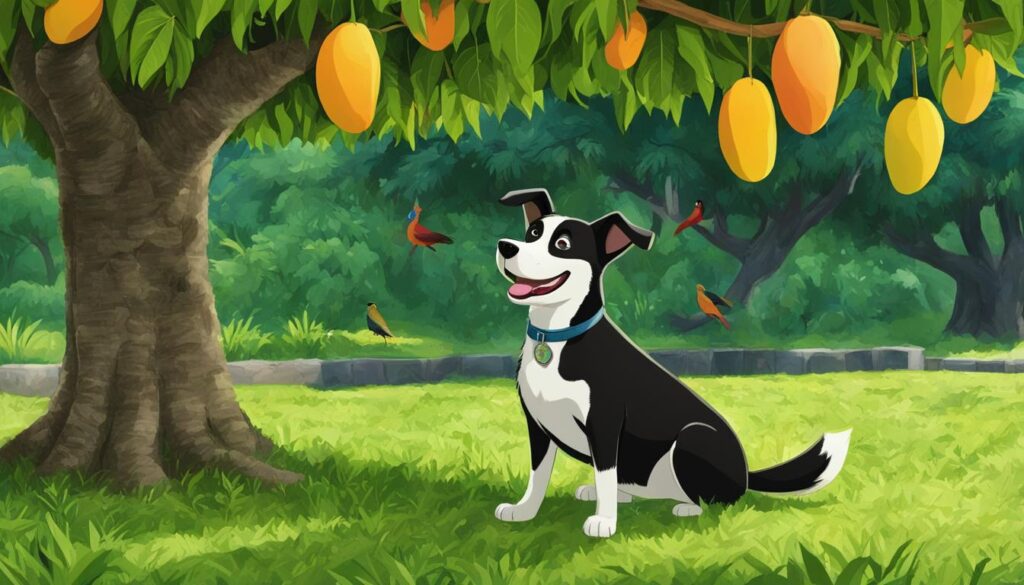Dogs have different digestive systems than humans, and while some human foods are safe for dogs to eat, others can be unhealthy or even toxic. It’s important for dog owners to know which fruits and vegetables are safe for their dogs to consume. This article will provide vet-approved advice on whether dogs can eat fruit snacks and recommend safe and healthy snack options for dogs.
Key Takeaways:
- Not all fruit snacks are safe for dogs to consume.
- Opt for fresh fruits like apples, bananas, and blueberries as safe snack options for dogs.
- Avoid giving dogs fruit snacks that contain toxic ingredients such as grapes or xylitol.
- Consult with a veterinarian before introducing any new foods to your dog’s diet.
- Choose dog treats specifically made with dog-friendly fruits for a healthier option.
Can Dogs Eat Apples?

Dogs can eat apples. Apples are a good source of vitamins A and C, as well as fiber. They are low in protein and fat, making them a healthy snack option for dogs, especially senior dogs. However, it’s important to remove the seeds and core before feeding apples to dogs. Frozen apples can also be a refreshing treat for dogs. Some dog treats are flavored with apples as well.
Health Benefits of Apples for Dogs
Apples offer several health benefits for dogs:
- Apples are a good source of vitamin A, which promotes good vision and supports a healthy immune system.
- Vitamin C in apples helps boost the immune system and promotes collagen production for healthy skin and joints.
- The fiber in apples aids in digestion and can help alleviate constipation in dogs.
When feeding apples to dogs, it’s best to serve them in small, bite-sized pieces to prevent choking. It’s also important to remove the seeds and core, as they contain small amounts of cyanide, which can be harmful to dogs if consumed in large quantities.
Frozen apples can be a refreshing and crunchy treat for dogs, especially during the hot summer months. Simply slice and freeze apples for a cool and healthy snack option.
Apple-Flavored Dog Treats
If you’re looking for an apple-flavored treat for your dog, there are various options available:
- Commercial dog treats: Many companies offer apple-flavored dog treats that are specifically formulated for canine consumption. These treats are often made with dog-friendly ingredients and can be a convenient and tasty option.
- Homemade treats: You can also make your own apple-flavored dog treats at home. There are numerous recipes available online that use dog-friendly ingredients like applesauce, oat flour, and peanut butter.
When choosing or making apple-flavored dog treats, be mindful of the ingredients and ensure they are safe for dogs to consume. Avoid treats that contain added sugars, artificial sweeteners, or other potentially harmful additives.
| Health Benefits | Precautions |
|---|---|
| Rich in vitamins A and C | Remove seeds and core |
| Good source of fiber | Feed in moderation |
| Low in protein and fat | Serve in small, bite-sized pieces |
Can Dogs Eat Bananas?

Dogs can eat bananas. Bananas are a low-calorie treat for dogs that provide various health benefits. They are rich in potassium, vitamins (such as vitamin C), biotin, fiber, and copper. Additionally, bananas are low in cholesterol and sodium, making them a healthy snack option for dogs.
However, it’s important to note that bananas contain a high sugar content, so they should be given to dogs in moderation. Too much sugar can lead to weight gain and other potential health issues. It’s recommended to consult with a veterinarian to determine the appropriate portion size for your dog.
Bananas can be served to dogs in a variety of ways. Some dogs enjoy eating sliced or mashed bananas directly. Alternatively, you can freeze sliced bananas and offer them as a refreshing treat on hot days. Additionally, there are banana-flavored dog treats available in the market, which can be a convenient option for dog owners.
It’s important to remember that dogs should always have a well-balanced diet that includes a variety of nutrients from different food sources. While bananas can be a part of a healthy diet for dogs, they should not be the sole food source.
Health Benefits of Bananas for Dogs
Adding bananas to your dog’s diet in moderation can provide several health benefits. Some of the benefits of feeding bananas to dogs include:
- High potassium content: Bananas are known for their high potassium content, which supports proper heart and muscle function in dogs.
- Vitamin C boost: The presence of vitamin C in bananas contributes to a strong immune system in dogs, protecting them from common illnesses.
- Promotes digestive health: The fiber content in bananas helps regulate digestion and can provide relief from constipation or diarrhea in dogs.
- Healthy skin and coat: Biotin, a B-vitamin found in bananas, promotes healthy skin and a shiny coat in dogs.
- Boosts energy: Bananas are a great source of natural energy and can provide dogs with a quick energy boost during physical activities.
Banana Dog Treats
If you’re looking for a convenient and mess-free way to incorporate bananas into your dog’s diet, banana dog treats are a popular option. These treats are specifically formulated with banana flavor and can be a tasty, healthy reward for your dog. Always check the ingredients and choose treats that are free from any harmful additives or artificial sweeteners.
Remember, while bananas can be a healthy treat for dogs, it’s essential to consider your dog’s individual needs and consult with a veterinarian before making any significant dietary changes. Providing a balanced and nutritious diet, along with regular exercise and veterinary care, is crucial for your dog’s overall well-being.
Can Dogs Eat Blueberries?

Dogs can eat blueberries, and it’s no surprise that they are often considered a superfood for both dogs and humans. Blueberries are rich in antioxidants, fiber, and phytochemicals, making them a healthy snack option for our canine friends.
Feeding blueberries to dogs can offer several health benefits. The antioxidants in blueberries help protect against cell damage caused by harmful free radicals, reducing the risk of chronic diseases. The fiber content aids in digestion and promotes a healthy digestive system.
Blueberries also have anti-inflammatory properties, contributing to overall health and well-being for dogs. Giving blueberries as an occasional treat can strengthen the immune system and support heart health due to their high levels of nutrients.
When introducing blueberries to your dog’s diet, it’s essential to start with small amounts to ensure they are well-tolerated. Some dogs may experience stomach upset or loose stools if they consume too many blueberries at once.
To make blueberries more enjoyable for your furry friend, you can serve them fresh as a treat or incorporate them into homemade dog treats. Many dog treat brands also offer blueberry-flavored options.
Health Benefits of Blueberries for Dogs:
- Rich in antioxidants that protect against cell damage
- High in fiber for a healthy digestive system
- Anti-inflammatory properties for overall health
- Strengthens the immune system
- Supports heart health
Remember, moderation is key when feeding blueberries to dogs. While they offer numerous health benefits, an excessive amount may lead to digestive issues due to their natural sugar content.
Overall, blueberries can be a delicious and nutritious addition to your dog’s diet. Just make sure to introduce them gradually, monitor their response, and prioritize a well-balanced diet that includes other dog-friendly fruits and veggies.
Comparison of Key Nutrients in Blueberries
| Nutrient | Quantity per 100g |
|---|---|
| Calories | 57 |
| Protein | 0.7g |
| Fat | 0.3g |
| Carbohydrates | 14g |
| Fiber | 2.4g |
| Vitamin C | 9.7mg |
| Antioxidants | Yes |
Can Dogs Eat Cantaloupe?
Yes, dogs can eat cantaloupe. Cantaloupe is a nutritious fruit that can be a healthy addition to your dog’s diet. It is low in calories and high in water content, making it a refreshing snack for dogs, especially during hot summer days. Cantaloupe is also packed with fiber and essential nutrients, providing various health benefits to dogs.
When feeding cantaloupe to your dog, make sure to remove the seeds and rind. These parts can be difficult for dogs to digest and may pose a choking hazard. It is best to cut the cantaloupe into small, bite-sized pieces to prevent any potential issues.
Cantaloupe can be enjoyed by dogs in its natural form or frozen as a cool and soothing treat. Frozen cantaloupe chunks can provide relief to dogs during the summer heat while offering them a healthy alternative to sugary snacks.
However, it’s important to remember that cantaloupe should be given to dogs in moderation. Like any other food, excessive consumption of cantaloupe can lead to digestive upset or other health issues. It’s always a good idea to consult with your veterinarian before introducing any new foods into your dog’s diet.
Can Dogs Eat Cherries?

Dogs should not eat cherries. While the fleshy part of the cherry fruit, also known as the cherry flesh, is safe for dogs to consume, other parts of the cherry plant contain cyanide, which is toxic to dogs. Cyanide can lead to severe health issues, including oxygen deprivation in the blood.
Cherry pits and fallen cherry fruit should be kept away from dogs to prevent accidental ingestion. Ingesting cherry pits can be particularly dangerous, as they contain higher concentrations of cyanide. It’s essential for dog owners to be vigilant and ensure that their dogs don’t have access to cherries or any other toxic plants.
If your dog enjoys the taste of cherries, there are alternative options available. Cherry-flavored dog treats can provide a safe and enjoyable experience for your furry friend, satisfying their cravings without risking their health.
It’s crucial to prioritize your dog’s well-being and nutritional needs when it comes to offering them food. While cherries may be a tempting treat, it’s best to avoid them altogether and opt for safe alternatives.
Health Risks of Cherries for Dogs
Cherries pose health risks to dogs due to the presence of cyanide in the cherry plant. Cyanide is a toxic compound that interferes with oxygen transport in the bloodstream. If a dog ingests a significant amount of cherry pits or unripe cherry fruit, it can result in cyanide poisoning, which can be potentially life-threatening.
Common symptoms of cyanide poisoning in dogs include difficulty breathing, dilated pupils, dizziness, vomiting, diarrhea, and even seizures. If you suspect that your dog has consumed cherries or any other toxic substance, it’s essential to seek immediate veterinary assistance.
Remember, prevention is key. Keep cherries and cherry plant remnants out of your dog’s reach to ensure their safety and well-being.
Cherry Dog Treats
While dogs should not eat fresh cherries, there are cherry-flavored dog treats available in the market. These treats offer a safe and tasty alternative for dogs that crave the taste of cherries. Choose trusted brands that prioritize the health and dietary needs of dogs to ensure the treats are both delicious and safe.
| Treat Brand | Description |
|---|---|
| The Canine Kitchen | Cherry Delight Dog Treats – Made with all-natural ingredients and a cherry flavor dogs love. These treats are free from harmful preservatives and artificial additives. |
| Pawsitive Paws | Cherry Biscuits – These crunchy treats provide a burst of cherry flavor while catering to your dog’s nutritional needs. They are crafted with wholesome ingredients and contain no added sugars. |
| Doggy Delights | Cherry Chewy Treats – Soft and chewy, these treats are perfect for dogs of all ages. The cherry flavor is irresistible, ensuring your dog gets a delightful snack without any health risks. |
When choosing cherry dog treats, make sure to read the product labels carefully to ensure the ingredients are suitable for your dog’s specific dietary requirements. It’s always recommended to consult with your veterinarian before introducing any new treats or food items into your dog’s diet.
Can Dogs Eat Grapes?

Dogs should never eat grapes. Grapes and raisins are highly toxic to dogs and can cause acute kidney failure even in small amounts. It’s important to be cautious and keep grapes out of reach of dogs, especially if there are children who consume grapes in the household. If dogs accidentally ingest grapes, it’s crucial to seek veterinary assistance immediately.
If you suspect your dog has eaten grapes or raisins, here are some symptoms to watch out for:
- Vomiting
- Diarrhea
- Loss of appetite
- Abdominal pain
- Excessive thirst or urination
- Lethargy
“Grapes and raisins can be extremely dangerous for dogs and should be avoided at all costs. If your dog has ingested grapes, it’s best to seek immediate veterinary help to prevent any potential complications.” – Dr. Jane Thompson, DVM
The exact reason why grapes and raisins are toxic to dogs is still not fully understood, but even a small amount can have devastating effects on their kidneys. It’s essential to be proactive and educate yourself about foods that are harmful to dogs to keep them safe and healthy.
| Signs of Grape Toxicity in Dogs | Actions to Take |
|---|---|
| Vomiting or diarrhea within a few hours of ingestion | Take your dog to the vet immediately |
| Signs of abdominal pain (whining, restlessness) | Do not induce vomiting at home; take your dog to the vet |
| Decreased appetite or lack of appetite | Contact your vet and monitor your dog’s behavior closely |
| Lethargy or weakness | Seek veterinary assistance immediately |
| Increased thirst or urination | Call your vet and provide them with details about the situation |
Can Dogs Eat Mangoes?

Dogs can eat mangoes. Mangoes are a sweet and juicy tropical fruit that is packed with essential vitamins and nutrients. The health benefits of mangoes for dogs include:
- High in vitamin C, which boosts the immune system
- Rich in vitamin A, which promotes healthy skin and coat
- Contains fiber, which aids digestion and helps prevent constipation
- Provides antioxidants that support overall health
When feeding mangoes to dogs, it’s important to:
- Remove the hard pit before feeding, as it can be a choking hazard
- Peel the skin, as it may be difficult for dogs to digest
- Feed in moderation due to the high sugar content
Mango dog treats are also available as a less messy alternative to fresh mangoes. These chewy treats provide dogs with the delicious flavor of mango while ensuring they can safely enjoy it.
Keep in mind that every dog is different, and some may have sensitivities or allergies to certain fruits. It’s always important to introduce new foods gradually, monitor your dog’s reaction, and consult with your veterinarian if you have any concerns or questions.
Health Benefits of Mangoes for Dogs
| Vitamin | Benefit |
|---|---|
| Vitamin C | Boosts the immune system |
| Vitamin A | Promotes healthy skin and coat |
| Fiber | Aids digestion and prevents constipation |
| Antioxidants | Support overall health |
Wrapping Up
After careful consideration, it is not recommended to feed fruit snacks to dogs. While dogs can technically eat fruit snacks, these treats are often high in sugar and may contain ingredients that can be toxic to dogs, such as grapes or xylitol. It is essential to prioritize the safety and well-being of our furry friends by opting for safer and healthier snack options.
Instead, dog owners should consider offering fresh fruits like apples, bananas, and blueberries, which are not only safe for dogs but also provide nutritional benefits. These fruits are rich in vitamins, fiber, and antioxidants, making them a healthy addition to a dog’s diet.
For those looking for convenient and dog-friendly snack options, there are also dog treats available in the market that are specifically made with dog-friendly fruits. These treats offer a safe and tasty alternative to fruit snacks and ensure that dogs receive the nutritional benefits without any harmful ingredients.
As always, it is crucial to consult with a veterinarian before introducing any new foods or treats to your dog’s diet. They can provide personalized advice based on your dog’s specific needs and help ensure that their diet remains balanced and healthy.
FAQ
Can dogs eat apples?
Dogs can eat apples. They are a good source of vitamins A and C and fiber. It’s important to remove the seeds and core before feeding apples to dogs. Frozen apples can also be a refreshing treat for dogs. Some dog treats are flavored with apples as well.
Can dogs eat bananas?
Dogs can eat bananas. Bananas are a low-calorie treat for dogs that are high in potassium, vitamins, biotin, fiber, and copper. They are low in cholesterol and sodium but should be given in moderation due to their high sugar content. Banana dog treats are also available for dogs to enjoy.
Can dogs eat blueberries?
Dogs can eat blueberries. Blueberries are considered a superfood for dogs and humans alike. They are rich in antioxidants, fiber, and phytochemicals. Blueberries can be given as a treat or used as an ingredient in blueberry-flavored dog treats.
Can dogs eat cantaloupe?
Dogs can eat cantaloupe. Cantaloupe is a nutritious fruit that is low in calories and rich in water, fiber, and nutrients. It is safe for dogs to consume in moderation, especially in frozen form as a refreshing summer snack.
Can dogs eat cherries?
Dogs should not eat cherries. The fleshy fruit around the cherry pit is the only part that is safe for dogs to consume, as cherry plants contain cyanide, which is toxic to dogs. Cyanide can lead to serious health issues such as oxygen deprivation in the blood. It’s important to keep cherry pits and fallen fruit away from dogs to prevent ingestion. If dogs crave the taste of cherries, there are cherry-flavored dog treats available.
Can dogs eat grapes?
Dogs should never eat grapes. Grapes and raisins are highly toxic to dogs and can cause acute kidney failure even in small amounts. It’s important to be cautious and keep grapes out of reach of dogs, especially if there are children who consume grapes in the household. If dogs accidentally ingest grapes, it’s crucial to seek veterinary assistance immediately.
Can dogs eat mangoes?
Dogs can eat mangoes. Mangoes are a sweet and juicy tropical fruit that is packed with essential vitamins and nutrients. It’s important to remove the hard pit before feeding mangoes to dogs, as it can be a choking hazard. Mangoes should be given as an occasional treat due to their high sugar content. Mango dog treats are also available as a less messy alternative.
Can dogs eat fruit snacks?
While dogs can technically eat fruit snacks, it is not recommended. Fruit snacks are high in sugar and often contain ingredients that can be toxic to dogs, such as grapes or xylitol. It’s best to avoid feeding fruit snacks to dogs and opt for safer and healthier snack options, such as fresh fruits like apples, bananas, and blueberries or dog treats specifically made with dog-friendly fruits. Always consult with a veterinarian before introducing any new foods to your dog’s diet.






